Welcome to Illinois SARE Program
Since 1988, the Sustainable Agriculture Research and Education (SARE) program has advanced profitable and environmentally sound farming systems that are good for communities through a nationwide research and education grants program.
The 2018 North Central Region Sustainable Agriculture Research and Education Program (NCR-SARE) has announced that proposals are now being accepted for four grants offered by the program. The four grants include the Research and Education Grant, the Partnership Grant, the Youth Educator Grant, and the Farmer Rancher Grant.
The Research and Education Grant Program is a competitive grant program for researchers and educators involved in projects that explore and promote environmentally sound, profitable, and socially responsible food and/or fiber systems.
Research and Education projects include a strong outreach component and significant farmer/rancher or other end user involvement from inception of the idea through implementation of the project. Research and Education grant awards range from $10,000 to $200,000 and projects may last up to 36 months. NCR-SARE anticipates funding 10-14 Research and Education projects per year.
Many projects are interdisciplinary and/or multi-institutional, involving a broad range of agricultural interests. Project coordinators in the past have explored sustainable agriculture in biocontrol, crop production, education/extension, networking, livestock production, marketing, quality of life, soil quality, value-added marketing, waste management, water quality, and weed control.
The deadline to apply for the Research and Education Grant is Oct. 18.
The Partnership Grant Program is intended to foster cooperation between agriculture professionals and small groups of farmers and ranchers to catalyze on-farm research, demonstration, and education activities related to sustainable agriculture.
Examples of appropriate projects include developing a curriculum about food storage for farmers and processors, on-farm testing of cropping system strategies or grazing systems, cooperative efforts to develop new marketing approaches, or investigations into new approaches to processing and/or adding value to sustainably produced farm products.
Partnership Grants are for on-farm research, demonstration and/or educational projects and are funded for up to 24 months, and up to $40,000 total funding requested per application. Any agriculture/natural resource professional in the North Central region may apply, including university educators (extension agents and specialists), NRCS field staff, agricultural consultants (individuals who actively consult with farmers and ranchers as certified crop advisors, soils consultants, ranching consultants, etc.), and nonprofit or agency staff assisting farmers and ranchers at the local level.
The deadline to apply for the Partnership Grant is Oct. 24.
The Youth Educator Grant Program supports opportunities for youth educators to research, demonstrate, and learn more about sustainable agriculture.
Youth Educator Grants are competitive grants, up to $4,000, for educators to provide programming on sustainable agriculture for youth.
The deadline to apply for the Youth Educator Grant is Nov. 15.
NCR-SARE's Farmer Rancher Grant Program is a competitive grants program for farmers and ranchers who want to explore sustainable solutions to problems through on-farm research, demonstration, and education projects.
Farmer Rancher grants have funded a variety of topics including pest/disease management, crop and livestock production, education/outreach, networking, quality of life issues, marketing, soil quality, energy, and more.
Farmer Rancher grants are offered as individual ($9,000 maximum), team of two ($18,000 maximum), or group ($27,000 maximum) grants for ideas initiated by farmers and ranchers. Projects may last up to 24 months. About 40 projects are funded each year.
The deadline to apply for the Farmer Rancher Grant is Dec. 6.
Since 1988, the Sustainable Agriculture Research and Education (SARE) program has advanced profitable and environmentally sound farming systems that are good for communities through a nationwide research and education grants program.
Tips for submitting a proposal include:
- Start early!
- Keep in mind your grant will be evaluated by how well it matches the SARE's 3 Ps of Sustainability: Profit over the long term; protection of our nation's land, air and water; people - quality of life for farmers, ranchers and their communities.
- The best proposals are planned and carried out by a variety of individuals or organizations. Past successful grant projects have involved Extension educators, nonprofit group participants, other farmers or ranchers, and/or other members of the community.
For more information visit the SARE website, Twitter, or Facebook, or contact SARE co-coordinators Doug Gucker (dgucker@illinois.edu) or Bruce Branham (bbranham@illinois.edu).
If you are in Illinois and you have an idea for one of these grants, fill out the form below to submit a short description and get feedback.
For more information contact Illinois SARE Project Manager Bruce Branhambbranham@illinois.edu.
A Farmer Rancher Grant Awardee Shares Her Journey!
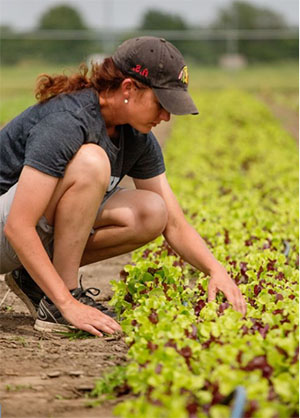
When we decided to embark on this farm adventure five years ago I did not take into consideration the educational components that would be involved. After completing the New Illinois Fruit and Vegetable Farmers course through University of Illinois Department of Crop Sciences in cooperation with the Extension's Local Food Systems and Small Farms Team and acquiring a lease courtesy of the Department of Crop Sciences, I was more concerned with the transition of my career and becoming a great farmer. One of the biggest lessons I have learned along the way is that you can plant the ground and grow the crops but if you don't have a market then the first part doesn't matter. The goal of our farm is to assist in paving the way for a food revolution, changing the way people eat and think about food. Education is such a major component when focusing on local and fresh food.

There is a large disconnect between utilizing fresh, local food in kitchens and institutionalized cooking. Institutionalized food is the forgotten part of the food revolution, where pre-packaged, processed foods are being served instead of fresh homemade food. Processed food is cheap and nutritional guidelines are easier to track and maintain. Also, food service employees have little to no training so it is easier to serve pre-made food that takes less preparatory skill.
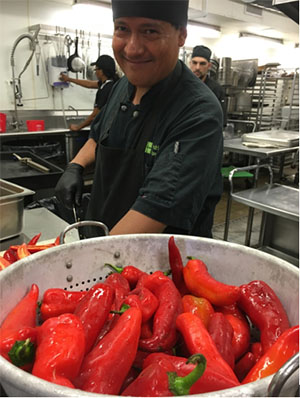
Children and adolescences have developed palettes for pre-processed food because that is what they are being served.
Local farmers are affected because the general population does not connect with the importance of reducing economic viability for these farmers. Small farms are faced with volume challenges when supplying large dining facilities.
Identifying and helping to solve these problems are important to Hendrick House because we are in the unique position of bringing change necessary to revamping the institutionalized food system, since we are producing fresh healthy food on our farm. As more chefs in the company purchase Hendrick House farm produce, our farm viability will also increase. It starts with education from all sides of the food chain. If we can change the way a generation looks at food, then it will have a lifetime impact for farmers, individuals, and the community.

Luckily, there are so many great organizations that are working towards the very goals mentioned above. The Land Connection and Illinois SARE have been instrumental in helping to connect me with people and programs that have put me on the right path with the necessary tools to get the word out regarding local food. Cassie Carroll formerly with the Land Connection, informed me about a SARE grant that I might be eligible for to help assist me with costs of implementing these ideas. I spent the months of October and November of 2016 forming a plan and applying for the SARE Farmer/Rancher grant. For any of you who have written grants you know how tedious it is. There were a lot of revisions up until moments before submission. Cassie was amazing and helped me all the way through until the deadline submission date of December 7.
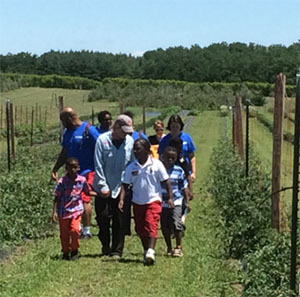
For the grant, I focused on targeting four population sectors for education. The first sector is youth in the community. I held a series of workshops for The DREAAM House this summer. DREAAM House is a school to college pipeline program to reach, teach and invest in boys and young men placed at risk with targeted focus on African American males. Thanks to Nicole Bridges, a board member for The Land Connection, she helped me identify curriculums suitable for each age group that attended. We had a scavenger hunt to identify different crops, we learned what it takes to grow healthy plants and we learned how to properly harvest crops for a healthy snack. It was really great to be able to host the children at the farm for the first half of the workshops then move to the kitchens for the second half, showing them both sides of the culinary world and what to make with the produce they harvested.
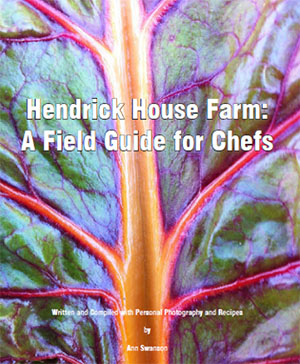
The second sector of people I focused on were food service workers within the company. I wrote and assembled a book to be used as a field guide to educate them in health benefits and proper storage and also provide them with recipes to build on when transitioning to farm fresh cooking. (This workbook will be available through the SARE Learning Center and also through The Land Connection.) I am hosting four workshops, three hours long, twice a year during which we will be writing menus for upcoming semesters with the hope that chefs will order more local food and we will discuss reducing food waste by using more in house processing methods.
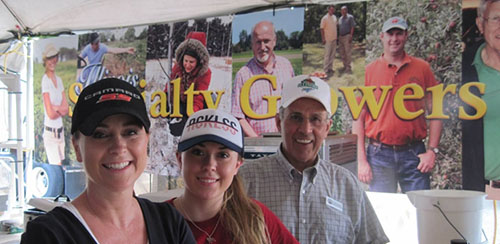
The third sector I am targeting is farmers. I plan to speak at the 2018 Specialty Crops Conference with the intent to increase business for local farms by sharing my knowledge on how to interact with chefs, packaging and receiving and what chefs look for regarding quality and reliability.
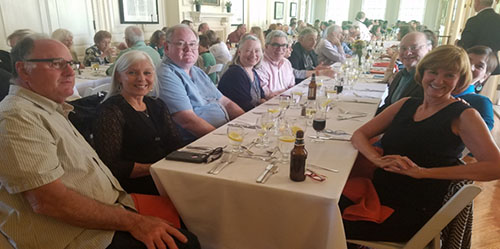
The fourth sector I am targeting is the general public. I write a weekly blog, which is also featured on Hendrick House Food Service's Facebook page. I have hosted and participated in local foods dinners at Allerton Park and Retreat Center and also with The Stewardship Alliance for their annual Harvest Celebration Fundraiser. I am doing a market demo with my good friend and fellow chef Alisa DeMarco in October for The Land Connection to promote local food and fresh cooking.
Although the grant we received is a two year grant we hope to make a change in institutionalized food that will be ongoing beyond the scope of this grant.
Illinois SARE currently has several grants open for calls for proposals: the Partnership Program (deadline is October 26, 2017), the Youth Educator Program (deadline is November 2, 2017) and the Farmer Rancher Program (deadline is December 7, 2017). If you have any interest in any of these grant programs contact Bruce Branham, SARE Project Manager. And follow SARE on Facebook and Twitter.
Happy farming and happy educating!!
See more of Ann’s blog at: https://hhfood.wordpress.com
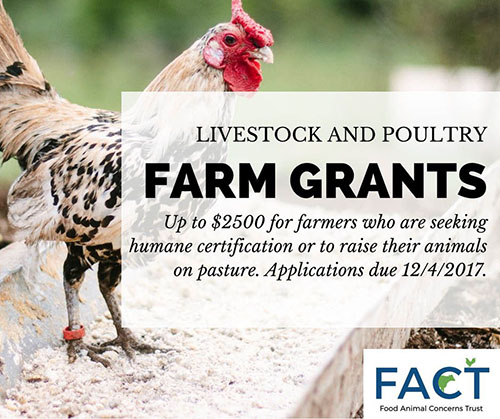
The online grant application is available at foodanimalconcernstrust.org/grants/. Applications are due by December 4, 2017 and grants will be awarded in January 2018.
See MANY more grant and funding opportunities from GoodGreens here.
Food Chapter of the Awesome Foundation / (Rolling deadlines)
Now accepting applications to further food awesomeness in the universe. Monthly awards of $1,000 are given and anyone can apply. Applications are accepted on a recurring basis.
Farm Aid (Rolling deadlines) provides grants to IRS 501(c)(3) tax-exempt nonprofit (family farm and rural service) organizations that fulfill the goals of three different programs:
Helping Farmers Thrive
Grants in this category fund organizations that provide farmers with the tools and resources they need
to get started on the land, access new markets, transition to more sustainable farming practices,
produce renewable fuels and stay on the land in the face of financial crisis and natural disasters.
Taking Action to Change the System
Grants in this category fund organizations that promote fair farm policies and grassroots organizing
campaigns to defend and bolster family farm agriculture, lifting the voices of family farmers and
promoting their interests on a local, regional or national level.
Growing the Good Food Movement
Grants in this category fund organizations that are creating innovative programs that build local and
regional food systems, connecting farmers directly to consumers and creating new value-added markets for
family farmers.
Whole Foods Local Producer Loan Program
Applications accepted on a rolling basis
- Streamlined process with fees, interest rates, and paperwork minimized
- Targeted loan amounts between $1,000 and $100,000 (maximum $25,000 for start-ups)
- Loan amount not to exceed 80% of total project cost
- Low, fixed interest rates (currently between 5% and 9%)
0% Interest Loans Available to Farmers from Kiva Zip!
Rolling deadline
Kiva Zip is a non-profit loan program for startup folks without startup money and break-even folks who want to expand towards profitability. Apply for up to $5000 in loans and pay 0% interest. No minimum credit score required and 6 month grace period for start-ups!
Education Highlights
Cover Crops for Sustainable Crop Rotations
There is a growing body of evidence that shows cover crops improve resilience in the face of erratic and increasingly intensive rainfall, as well as under drought conditions. Cover crops help when it doesn't rain, they help when it rains, and they help when it pours!
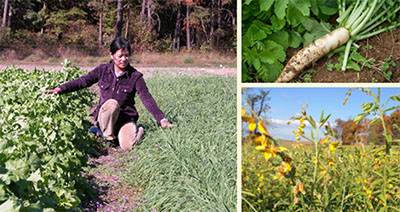
SARE's Learning Center offers a variety of sustainable agriculture information including:
- Production and marketing
- Practical handbooks
- Free bulletins
- Online courses
- How-to fact sheets based on SARE research projects
